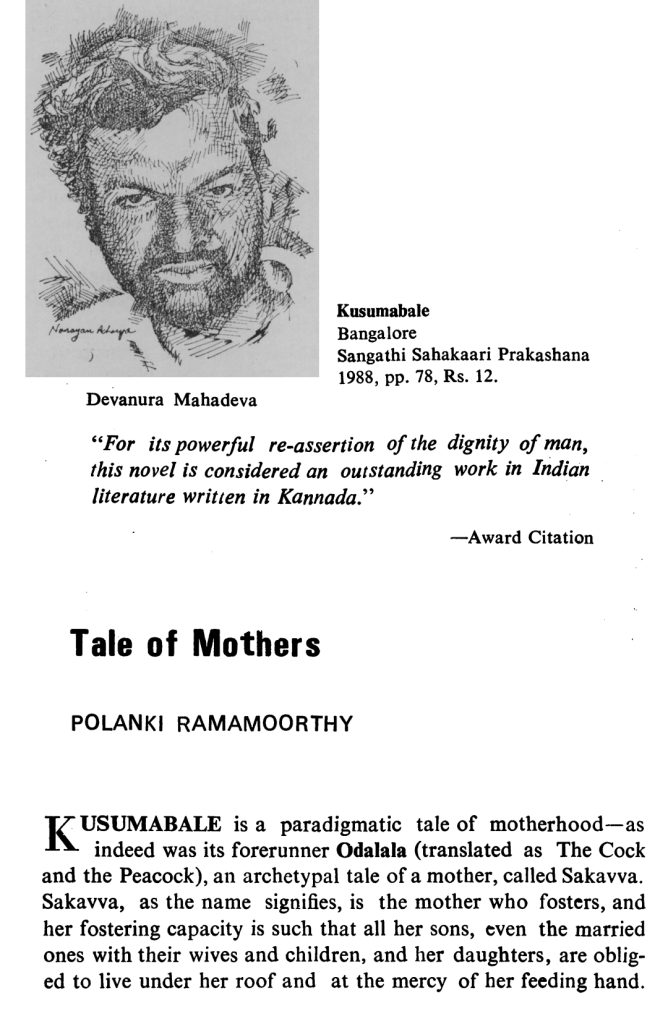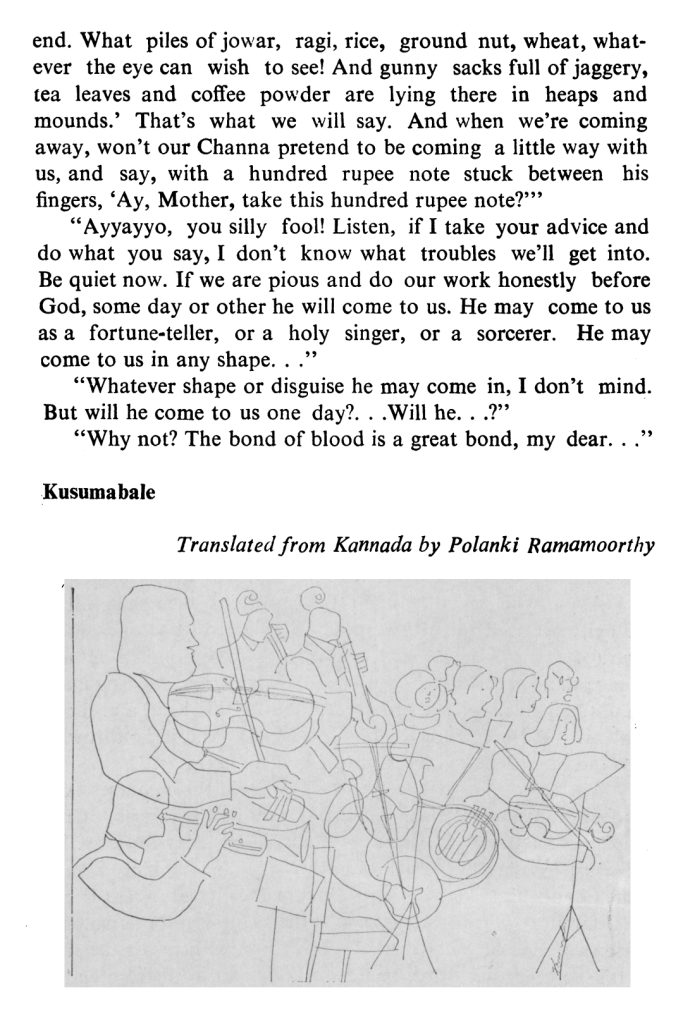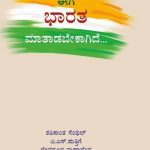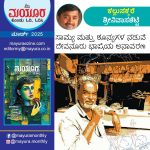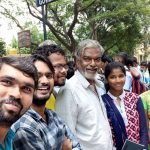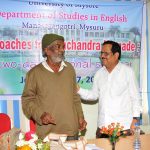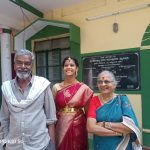Tale of Mothers-Kusumabale Review by: POLANKI RAMAMOORTHY.
[Devanura Mahadeva’s Kusumabale Review by: POLANKI RAMAMOORTHY. Source: Indian Literature, Vol. 34, No. 6 (146) (November-December, 1991), pp. 48-54
Published by: Sahitya Akademi. Thanx to critic V.L.Narasimhamurthy for sending this review to Nammabanavasi. ದೇವನೂರ ಮಹಾದೇವ ಅವರ ಕುಸುಮಬಾಲೆ ವಿಮರ್ಶೆ: ಪೋಲಂಕಿ ರಾಮಮೂರ್ತಿ ಅವರಿಂದ .ಮೂಲ: ಭಾರತೀಯ ಸಾಹಿತ್ಯ, ಸಂಪುಟ. 34, ಸಂ. 6 (146) (ನವೆಂಬರ್-ಡಿಸೆಂಬರ್, 1991), ಪುಟಗಳು. 48-54 ಪ್ರಕಟಣೆ: ಸಾಹಿತ್ಯ ಅಕಾಡೆಮಿ. ಈ ವಿಮರ್ಶೆಯನ್ನು ನಮ್ಮಬನವಾಸಿಗೆ ಕಳುಹಿಸಿದ್ದಕ್ಕಾಗಿ ವಿಮರ್ಶಕ ವಿ.ಎಲ್.ನರಸಿಂಹಮೂರ್ತಿಯವರಿಗೆ ಧನ್ಯವಾದಗಳು]
“For its powerful re-assertion of the dignity of man, this novel is considered an outstanding work in Indian literature written in Kannada.”
-Award Citation
KUSUMABALE is a paradigmatic tale of motherhood-as indeed was its forerunner Odalala (translated as The Cock and the Peacock), an archetypal tale of a mother, called Sakavva. Sakavva, as the name signifies, is the mother who fosters, and her fostering capacity is such that all her sons, even the married ones with their wives and children, and her daughters, are obliged to live under her roof and at the mercy of her feeding hand.
Indeed Sakavva becomes so aggressively protective that after her husband’s death, she ties up her sari in the manner of a dhoti, and becomes a man, and in her newly-acquired role of man all her dependent sons are virtually “unmanned”. Thus Sakavva becomes the Great Mother, the Kali, Durga or Shakti.
Kusumabale is a tale of mothers, the Chief of them being Akkamadevamma who raises her child, Yada, entirely on her own, into a most capable and resourceful young man. Now Yadegowda, with his riches, buys the house of those who had thrown him and his mother out on to the grazing ground and converts it into a cattle-shed-a just revenge.
Kusumabale illustrates how society with its artificial barriers of untouchability of caste or class seeks to secure its ‘purity’ against the ‘polluting’ vital forces of life, and how, in the process, impoverishes itself until life asserts itself to fertilise and resuscitate the weakened stock.
Kusumabale, like Odalala, rightly celebrates the mother, the Eternal Mother whose role is central to conception, birth and propagation- the cycle of life, where the father’s role is but tangential or, at best, instrumental. As such, the tale, in its saga of motherhood, establishes the cruciality of motherhood for the survival of the species. Akkamadevamma, Kusumabale, Kempi, Turamma and Iri are nothing if they are not mothers, and each one is unique in the way she fulfills her destiny of motherhood to ensure the survival of her child. And Iri’s devotion and love and superhuman-‘magical’- efforts to save her sickly child is something unique in the world literature.
Believing in the magic cure of her sickly child if her poor starving darling is surprised with the abundant spread of the most mouth-watering festive fare, Iri begs and borrows money from every possible source and prepares every item of the festive cornucopia. She lets her darling in, the sole relisher of the delicacies spread out infinitely before him and watches, unknown to him, his ecstatic tasting of every item of the festive fare:
The trembling finger probes the meat and sambar,
the finger smeared with sambar comes to the tongue.
the tongue licks the finger,
the finger is sent to the payasam,
the tongue laughs and licks the payasam on the finger,
and the finger is sent to fetch gulkhan, the rose-petal jam,
the jam that sticks to the finger is lapped,
then liver and kidney come for the tongue to suck,
and life is making its rounds now in those bones,
and they don’t know what to eat next, what to eat next.
So it happened that the child’s body lost its senses,
and losing the senses it slumped to one side and fell.
Turamma, breathless, rushed forward, groping,
But Iri just looked and went on looking,
She stood there and went on standing.
As if death too had been waiting for that child’s bones
to eat so many things,
as if waiting for a little
juice to be playing in those bones,
Death now sucked that juice and moved on.
But the smile that had come to the face of the child,
the kingdom of the full bowl
which had gone into its eyes,
the smile that had become the face of Iri’s child-
Death, perhaps deliberately, did not take this smile away.
It allowed that smile to stay on the face,
it left without closing that blossomed mouth and eye,
and then…
As truly as Maurya of Synge’s Riders to the Sea, who symbolically receives every child back to her womb as she buries it in the womb of the earth, does Iri recover her smiling child back into her body as it were, as she wears the smile of the dead child on her still face. Who knows her child may yet return, for the mother is alive. The child is dead but long live the mother!
We have Satyakamma Jabala of the Upanishads and Vyasa of Mahabharata to testify to their ‘immaculate’ births, and ‘immaculate’ lives.
Here is Kusumabale’s ‘immaculate’ child, which she has borne to her untouchable lover, Channa:
That room, with air and light locked out, was warm with Kusuma’s breath. The flame of the castor-oil lamp glowed softly. On Kusuma’s arm lay the little baby, its innocent eyes blooming in the still light of the flame.
The baby, unmindful of day and night, was cooing and waving its legs and arms. But the mother, lost in herself, lay sleeping. Her forehead was beaded with sweat, beads that broke now and then, trickling down her face, so even her hair stuck to that dampness and not a hair moved. Prasad, her twelve year-old brother, sat and watched the wonder of the baby’s play.
The soft light of the castor-oil lamp spilled into the depths of his wondering god-eyes, the cool depths of his unblinking eyes, and the light spilled out again even softer and cooler.
The Saliva oozed from his overflowing mouth, and Mother Earth received the juice in both her hands.
(pp. 5-6)
The steady flame of the lamp, the bracing breath of the mother, the honeyed dribble from the mouth of the ‘god child’ that the earth is blessed to receive, testify to the immaculate birth of the black new-born. Blessed, therefore are the mothers like Akkamadevamma and Kusumabala, the true ‘flower-child’, that bear immaculate children who shall inherit the earth, as Yadegowda has done in three generations, and hopes to do so, in the fourth one, too. His grand-daughter, Kusumabala, has given birth to an ‘immaculate’ child like him, an untouchable- truly an ‘untouchable’- “beyond reproach, pure immaculate❞— in the positive sense of the term Varnasankara. The mixing of castes, then, is natural, while the taboo on it is cultural, and therefore, inhibitive and impoverishing.
Kusumabale is a testament of motherhood where the women fulfil themselves in motherhood by breaking the hide-bound barrier of varnasankara, the central bane to Indian unity as a people, a culture and a civilisation. Kusumabale imaginatively realises the prophecy that the woman shall fulfil her biological destiny of motherhood of bearing, rearing and propagating, and that she shall annihilate any social barrier that seeks to thwart her destiny. Myth and legend, history and politics, nature and nurture, magic, folklore and fairy tale- all go to weave the most glorious imaginative tapestry of Kusumabale.
The opening lines of the poetic novel Kusumabale establishes the paramountcy of motherhood. As the lamp-mothers discuss Kusumabale’s black child born to her black untouchable lover, Channa, the following remark by one of the lamp-mothers establishes the triumph of nature over nurture, of human instinct over social customs:
The last word was hardly spoken when the Brahmin lamp-mother said, “Ay she is telling us what every one is doing. Is that news worth talking about?”
Kusumabale is a poetic testament of the prophecy that the Mother as the vehicle of creation holds the key to the survival of mankind as a species beyond the man-made divisive categories of caste, colour and creed, that it is the Mother who truly inherits the earth, no matter how man, in his male ego, seeks to suppress her by denying her, her inviolable biological right to motherhood and that she shall choose the man who shall enable her to fulfil her destiny of motherhood.
An Excerpt
That was the state that Kusuma was in, and Channa’s mother stood against the doorpost of her house, which had not been whitewashed or painted for the fire-crossing festival. She stood there staring blankly at her husband, who lay in his usual place, stuck to the ground. At last, unable to bear her grief any longer, Channa’s mother said, “Come!” Channa’s father looked up. “Come here a while!” She said again. Channa’s father, without getting up, asked, “What is it? Tell me. I can hear you from here, can’t I?” Channa’s mother replied, “It’s just… what
everyone is talking about. Can’t we also go there one day to see our son?” Channa’s father laughed, coughing.
“Ay, you silly fool! What do you think Bombay is? Do you think I am just sitting here without consulting anyone? Listen, then. I believe that beyond Bombay is all water, and only water. There isn’t even a three-paisa piece of what we call land there. If they went there and got lost, why, even Hari, Hara and Brahma, the mighty Gods themselves, could not hope to get back home. That is the kind of town it is! And can you suppose that it would ever be possible for the likes of us to go there? Forget it, silly!”
“I mean only this. We could go just as far as the gate of the King’s durbar, and wait there for a week. He comes there for his work, doesn’t he?”
“Ay, ay, you silly fool! Suppose we make up our minds to go there, is it a place we could get to on foot? I believe it takes three days by train to go there and three more days to come back. And on top of that, the fare, I believe, is one hundred rupees each. Just work out how much we would need. . .”
“We will put our mother’s son to bonded labour. We will lease out our little piece of land…”
“Ayyo, you stupid woman! Do you think even that will be enough? All right, then. Suppose we do as you say, and take a loan for as much as we need, and then go to see him. If by any chance that proud king sees us and realizes that our Channa is an untouchable, what then? He will cut off his head and throw it away. It is all water there, you know. And if he throws it into the water, what can you and I ever do about it?”
“Ah, as soon as we see the king we will throw ourselves at his feet and say, ‘We are bonded slaves in the house of our master Channarasa, who is now employed by Your Majesty. We were just passing by, Your Majesty!’ If then the king asks us more about him, we will say, ‘Our master Channarasa is of a great family. Our master’s shop is the biggest in the town, and these two eyes of ours are not enough to see how big the shop is. It’s so long that three men can lie down in it from end to end. What piles of jowar, ragi, rice, ground nut, wheat, whatever the eye can wish to see! And gunny sacks full of jaggery, tea leaves and coffee powder are lying there in heaps and mounds.’ That’s what we will say. And when we’re coming away, won’t our Channa pretend to be coming a little way with us, and say, with a hundred rupee note stuck between his
fingers, ‘Ay, Mother, take this hundred rupee note?””
“Ayyayyo, you silly fool! Listen, if I take your advice and do what you say, I don’t know what troubles we’ll get into. Be quiet now. If we are pious and do our work honestly before God, some day or other he will come to us. He may come to us as a fortune-teller, or a holy singer, or a sorcerer. He may come to us in any shape.
“Whatever shape or disguise he may come in, I don’t mind. But will he come to us one day?. . .Will he…?”
“Why not? The bond of blood is a great bond, my dear…”
